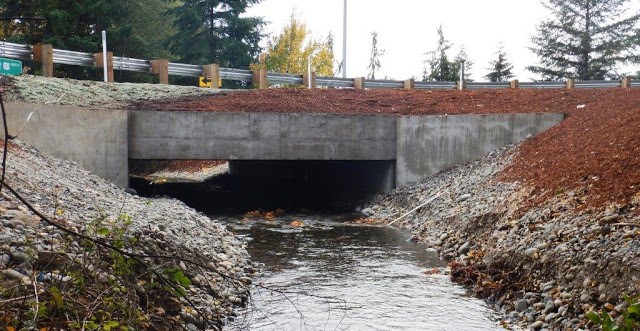
By Pepper Fisher
PORT ANGELES – The $36 million project to restore salmon migration at Bagley and Siebert Creeks reached something of a milestone Thursday when travelers began using the new bridge in one lane on the eastbound side. The big bumps at Bagley Creek in the westbound lanes will be gone over the weekend as paving begins, and the whole project should wrap up sometime this winter.
But in terms of fish passage projects in the Port Angeles area, the Bagley/Siebert Creek job was just a warmup. KONP is the first to learn from the Department of Transportation that Ennis Creek, Lees Creek and Tumwater Creek along Highway 101 in Port Angeles will all be getting similar treatments starting next summer, and traffic is expected to be interrupted for two years.
“When it’s done, it’ll be a really great win for fish, and it will also open up lots of habitat for salmon migrating in and out of that area.
That’s Tina Werner from WSDOT, who tells us the biggest change to traffic during construction will be that all through-traffic on Lincoln Street will be diverted to the Tumwater Truck Route, because the culvert replacement will close 101 just east of the Truck Route overpass at the top of the hill.
The Ennis and Lees Creek projects, on either side of Monroe Road at the east end of town, will likely narrow 101 to one lane each way.
“We can’t necessarily presume what the traffic control maybe just yet, but WSDOT will do everything possible to maintain travel, to keep people moving, and to limit closures as much as possible.”
All three jobs will be performed by the same contractor and will take place concurrently.
We’ve also learned that a similar project at Indian Creek, on 101 just west of the Elwha River Bridge, will begin this fall. Traffic will be diverted to a shoo-fly, or temporary bypass, around the culvert as workers build a concrete girder bridge.
And finally, Werner says the Elwha River Bridge replacement project is expected to begin next summer and should be completed by the fall of 2023.
In 2013, a federal court injunction required our state to significantly increase our efforts in removing state-owned culverts that block habitat for salmon, bull trout and steelhead.
